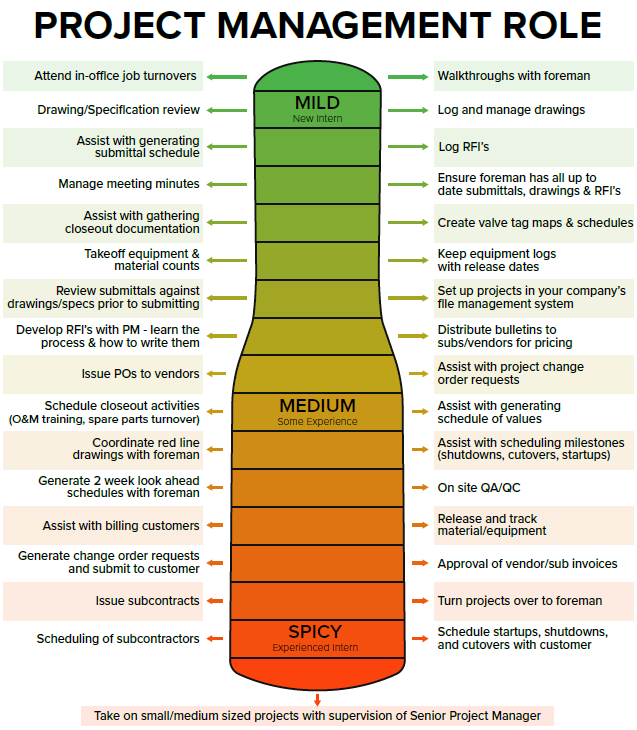Apprenticeship opportunities provide challenging, real-world projects specific to each apprentice’s career path. The apprentice will be paired with a NECA contractor to develop a solid understanding of the overall business and gain specific insight into Project Management. Working within the various departments on day-to-day and long-term projects, the apprentice will be involved in activities related to process improvement, project management, data support, reporting, documentation, and other assigned responsibilities.
The hosting contractor will be responsible for tracking the progress of the apprentice throughout the program and submitting progress reports to the local NECA chapter for record keeping.
Each NECA contractor is unique and has the autonomy to provide training opportunities as they see fit, so training opportunities may vary. However, the apprentice should gain experience with many of the following items:
ORIENTATION – 20 Hours
- General, introduction to company, projects, and facilities
- Employee Handbook
- Company policies
- Company operations
- Roles and responsibilities of team members
SAFETY PROCEDURES – 40 Hours
- Worker rights
- Legal responsibilities of employers, employees
- OSHA requirements
- Jobsite safety plan
- Emergency response procedures
- Hazard identification and protection
- Home office and project office protocol
BUILDING METHODS AND SYSTEMS – 375 Hours
- Sources, properties, and applications of building materials
- Materials testing, ASTM, and AASHTO standards
- Structural components
- Structural theory and building enclosure design
- Structural systems
- Building codes and design standards
- Delivery methods
- CAD systems and building information modeling
- Sustainability
SURVEYING – 65 Hours
- General site and building layout
- Instrument calibration and use
- Horizontal and vertical controls (elevation)
- Horizontal and vertical curves
MANAGEMENT – 1,500 Hours
Project Management
- Planning, scheduling, and goal setting
- Communication with staff, owners, developers
- Determining labor requirements
- Determining appropriate construction methods
- Supply selection, inventory tracking
- Determining and obtaining appropriate permits and licenses
- Directing and supervising workers
- Developing and implementing quality control systems
- Reviewing and reporting progress
- Coordinating subcontractors
- Investigating and adapting to delays, accidents, emergencies, etc.
- Resolving employee disputes, complaints, construction problems
Cost Management
- Evaluating cost effectiveness of plans and construction methods
- Preparing and submitting budget estimates
- Preparing and submitting progress and cost tracking reports
- Creating and sending purchase orders/contracts to subcontractors
- Payroll
Contract Administration
- Preparing contracts with various audiences (e.g., architects, consultants, clients, subcontractors)
- Negotiating revisions, changes, and additions to contractual agreements
Safety Management
- Ensuring compliance with building and safety codes and regulations
- Analyzing, managing, and mitigating risks
Equipment Management
- Earthmoving equipment
- Heavy transportation equipment
- Crane selection, setup and safety regulations
- Analysis and selection of equipment fleet
Sustainability & Green Construction
- LEED certification compliance
- Environment friendly & recycled materials
TOTAL – 2,000 Hours

Graphic courtesy of MCAA
